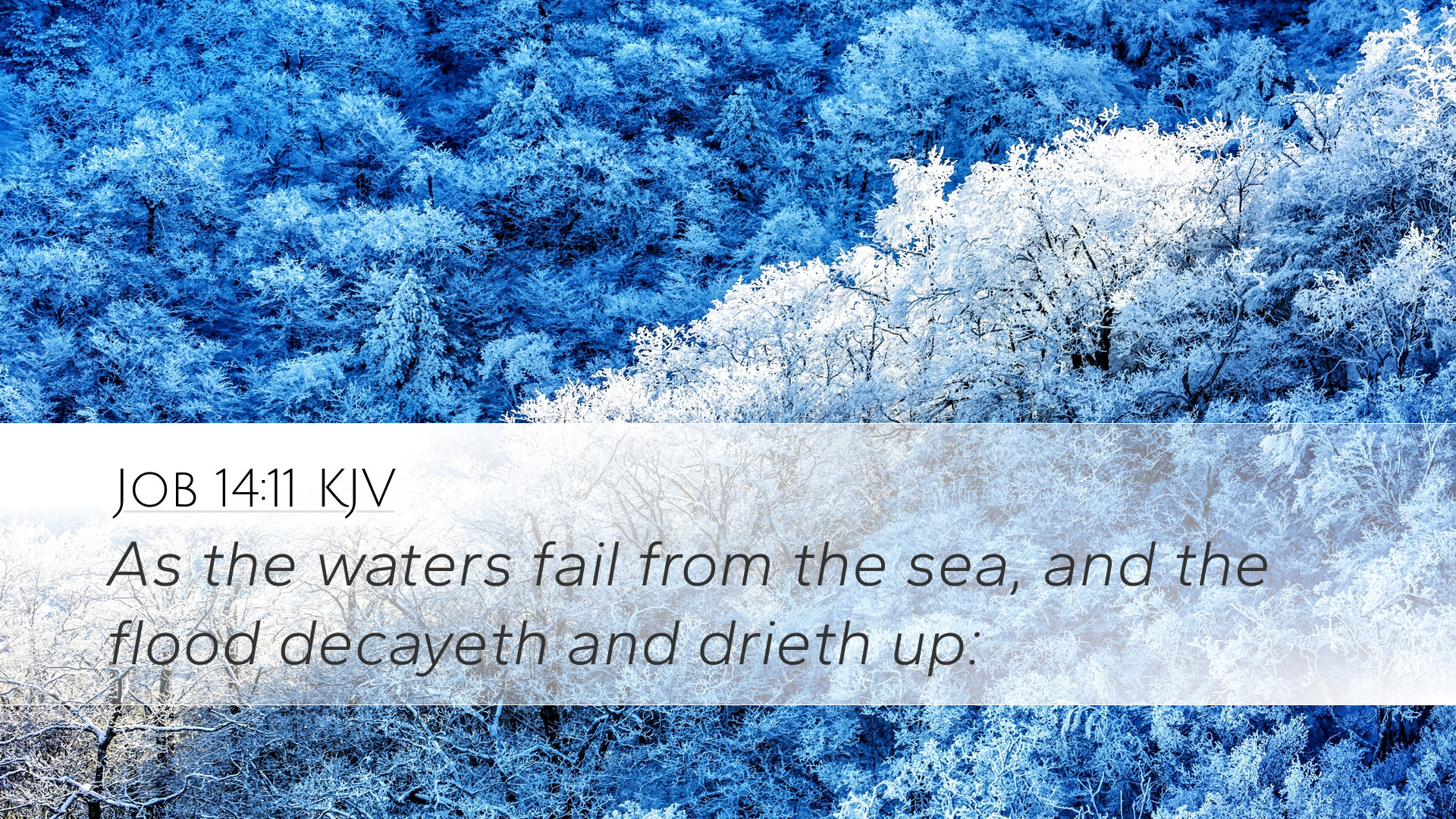Old Testament
Genesis Exodus Leviticus Numbers Deuteronomy Joshua Judges Ruth 1 Samuel 2 Samuel 1 Kings 2 Kings 1 Chronicles 2 Chronicles Ezra Nehemiah Esther Job Psalms Proverbs Ecclesiastes Song of Solomon Isaiah Jeremiah Lamentations Ezekiel Daniel Hosea Joel Amos Obadiah Jonah Micah Nahum Habakkuk Zephaniah Haggai Zechariah MalachiJob 14:11
Job 14:11 KJV
As the waters fail from the sea, and the flood decayeth and drieth up:
Job 14:11 Bible Commentary
Commentary on Job 14:11
Verse: "As the waters fail from the sea, and the flood decayeth and drieth up:" - Job 14:11
Contextual Background
The book of Job confronts the profound issue of human suffering and the inscrutable ways of God. Written in an ancient poetic form, the dialogues between Job and his friends offer insight into the nature of God, human suffering, and the hope of redemption. Job 14 marks a pivotal moment where Job articulates the futility of human existence and the relentless certainty of death.
Exegesis of the Verse
The metaphorical language used in Job 14:11 draws a vivid parallel between the natural phenomena of water and the state of human life. The image of the sea's waters failing and the flood drying up is a profound illustration of mortality and the transient nature of existence.
Water as a Symbol
Water often symbolizes life, sustenance, and vibrancy in biblical literature. In Job's metaphor, the failing of water signifies the inevitable decline and cessation of life itself. The comparison introduces the themes of despair and the formidable presence of death.
Death as an Inexorable Reality
Job's lamentation highlights his acute awareness of mortality. Albert Barnes notes in his commentary that Job speaks of the universal truth that death is the ultimate end of all temporal life. This realization generates an existential crisis as Job grapples with the seeming injustice of suffering and the finality of death.
The Detailed Observations of Commentators
- Matthew Henry: In his commentary, Henry emphasizes the natural order of life and death. He observes that just as waters diminish, so does life wax short. His reflections on the fading of waters liken it to human life, which quickly diminishes and often goes unrecognized until it is almost gone.
- Albert Barnes: Barnes elaborates on the futility of life, asserting that the transitory nature of water serves as a metaphor for human beings. He interprets Job’s expressions as highlighting the fragility of life and the reality that, like water, people wither away. Barnes postulates that understanding this truth urges individuals to contemplate eternal truths beyond earthly suffering.
- Adam Clarke: Clarke provides a nuanced interpretation by indicating that Job's mention of the drying flood aligns with the broader theme of human despair. He suggests that the drying up of water is akin to the drying up of hope for eternal significance and meaning amidst suffering. Clarke’s insight points toward a hesitance to accept the finality of death without questioning the possibilities beyond it.
Theological Implications
Job 14:11 serves as a reminder of human frailty and the ultimate authority of God over life and death. There are significant theological implications woven through Job’s despair and reflections:
- Human Nature and Sin: The reality of suffering is deeply connected to human nature’s fallen state. Job’s lament reflects the universality of suffering and the Christian understanding of original sin, where death entered the world through sin (Romans 5:12).
- God's Sovereignty: This verse challenges believers to reflect on God's sovereignty even amidst pain. The temporary nature of existence points to the hope found in God’s plan for redemption and eternity through Christ.
- The Hope of Resurrection: While Job voices despair, later texts in the Bible resonate with a hope that transcends death. The New Testament speaks of a resurrection that offers believers a hope beyond the grave (1 Corinthians 15:55-57).
Application for Leaders and Scholars
This passage invites pastors, theologians, and students to grapple with existential themes. It presents an opportunity to dialogue about suffering in the context of God’s justice and mercy. Here are considerations for application:
- Preaching Comfort: Pastors may draw on this passage to comfort those facing the reality of suffering and death, emphasizing God's presence amidst hardships.
- Exploring Questions of Suffering: Theological discussions can engage with the meaning of life, death, and the assurance of resurrection, helping to foster a deeper understanding of these realities.
- Encouragement for Faith: Encouraging faith even amidst despair resonates with Job’s struggle. It affirms that God’s character remains steadfast even when life's fleeting nature is overwhelming.
Conclusion
Job 14:11, with its poignant imagery of failing water, serves as a profound reminder of the transience of human life. Commentators like Henry, Barnes, and Clarke guide us through an understanding of this text, offering insights that stretch beyond the covenantal experience of ancient Israel into the hearts of contemporary believers. Ultimately, this verse challenges us to confront our mortality with courage while holding on to the promise of hope in God’s eternal plan.


